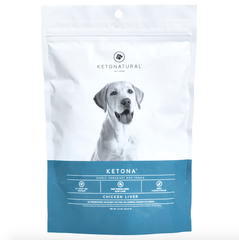Save Money, Save Your Dog.
Join Our Email List For Discounted Pricing and a Free Guide to the Science of Keto Dog Food.
Evaluating the Benefits of Canine Carbohydrate Restriction: Carbohydrate Restriction as Adjunct Treatment for Preventing or Slowing the Progression of Canine Cancers
Original White Paper can be viewed here
Abstract
Recently it has been theorized that restricting the intake of dietary carbohydrates (through ketogenic diets, caloric restriction, or some other means) might prevent or slow the progression of one or more canine cancers, when implemented in conjunction with standard anticancer therapies. In this white paper we briefly examine the evidentiary basis for this contention and conclude that the theory is explained by a coherent and well-documented mechanistic model and supported by a sizable body of evidence from rodent studies. However, while findings consistent with an anticancer effect of carbohydrate restriction in dogs do exist, the theory has yet to be tested directly on dogs in any systematic fashion.
Evidence Review
For 70 years or more, the scientific community has understood that many types of cancer cells preferentially metabolize glucose in order to fuel their furious rates of proliferation. This observation, first made by Nobel-winner Otto Warburg, is the foundation for the so-called “metabolic theory of cancer,” an etiological explanation for the disease which posits that cellular mitochondrial dysfunction is its primary cause and which stands in opposition to the prevailing view that cancer is most fundamentally a disease of somatic mutation.
Cancer is widespread in modern pet populations and the metabolic theory of cancer is currently enjoying something of a renaissance among researchers. Accordingly, in this white paper we briefly examine the extent to which the evidence suggests that ketogenic diets and other forms of dietary carbohydrate restriction might serve as effective adjunct therapies in the treatment of canine cancers. (Importantly, we do not in any way mean to suggest that carbohydrate restriction ought to be used instead of standard cancer treatments.)
The evidence for the Warburg Effect is indisputable, although some research suggests that it is not universally applicable to all cancers (see, e.g., Funes et al. 2007). Indeed, enhanced glucose uptake by cancer cells is sufficiently prevalent as to form the basis for positron emission tomography (PET) scanning, one of the most common and accurate clinical cancer imaging technologies.
Because many (if not most) cancer cells preferentially metabolize glucose, recently researchers have begun to examine the extent to which limiting the substrate’s availability might serve to prevent or slow the progression of the disease. Notably, several research teams have tested whether reducing carbohydrate intake (through implementation of a low-carbohydrate [“ketogenic”] diet or through overall caloric restriction) serves to prevent or slow the progression of cancer by effectively “starving” cancer cells of glucose, their preferred source of metabolic fuel.
Meta-analyses indicate that these interventions tend to show a positive anticancer effect, at least in mice and other animal models. For instance, Guan et al. (2014) found that 40 of 44 (>90%) qualifying studies supported the positive anticancer role of caloric restriction and that eight of nine (>88%) qualifying studies supported the positive anticancer role of ketogenic diets. Other similar meta-analyses have reached similar conclusions as well (see, e.g., Dirx et al. 2003; Klement et al. 2016) and, to our knowledge, no meta-analyses have reached competing conclusions.
To date, similarly comprehensive analyses have not been conducted on longer-living subjects, such as dogs, cats, and human beings. However, the aforementioned studies are consistent with the sizable body of evidence suggesting that caloric restriction tends to extend overall lifespan in nearly all species (including both humans and dogs), as well as recent evidence suggesting that increased carbohydrate intake is associated with increased mortality in humans (Dehghan et al. 2017; Ristow et al. 2017).
It is therefore our opinion that further research is needed in order to state with a high degree of confidence the role that carbohydrate restriction ought to play in the treatment of canine cancers. However, given the ease with which carbohydrate restriction can be effectuated in dogs (such as through the use of commercial raw-ingredient diets or other low-carbohydrate feeding strategies) and the lack of evidence that such a diet presents any unique health risks, we believe that clinicians and pet owners might well consider carbohydrate restriction as an adjunct therapy to be used to complement standard cancer therapies.
OVERALL SUPPORT FOR PRIMARY THESES
5/10: Coherent pathophysiological model bolstered by compelling experimental evidence from other animal models, but very limited on-point, species-specific evidence.
References
[1] Dehgham et al. 2017. “Associations of Fats and Carbohydrate Intake With Cardiovascular Disease and Mortality in 18 Countries From Five Continents (PURE): A Prospective Cohort Study.” Lancet. (doi: http://dx.doi.org/10.1016/S0140-6736(17)/32252-3).
[2] Dirx et al. 2003. “Energy Restricition and the Risk of Spontaneous Mammary Tumors in Mice: A Meta-Analysis.” International Journal of Cancer. 106:766-70.
[3] Funes et al. 2007. “Transformation of Human Mesenchymal Stem Cells Increases Their Dependency on Oxidative Phosphorylation for Energy Production.” Proceedings of the National Academy of Sciences of the United States of America. 104(15):6223-28.
[4] Guan et al. 2014. “Roles of Caloric Restriction, Ketogenic Diet and Intermittent Fasting During Initiation, Progression and Metastasis of Cancer in Animal Models: A Systematic Review and Meta-Analysis.” PLoS One. 9(12):e115147.
[5] Klement et al. 2016. “Anti-Tumor Effects of Ketogenic Diets in Mice: A Meta-Analysis.” PLoS One. 11(5):e0155050.
[6] Kroemer et al. 2008. “Tumor Cell Metabolism: Cancer’s Achilles’ Heel.” Cancer Cell. 6(10):472-82.
[7] Mathupala et al. 1997. “Aberrant Glycolytic Metabolism of Cancer Cells: A Remarkable Coordination of Genetic, Transcriptional, PostTranslational, and Mutational Events That Lead to a Critical Role for Type II Hexokinase.” Journal of Bioenergetics and Biomembranes. 29(4):339-43.
[8] Ristow et al. 2017. “Dietary Carbohydrates Impair Healthspan and Promote Mortality.” 26(4):585-87.
[9] Seyfried 2015. “Cancer as a Mitochondrial Metabolic Disease.” Frontiers in Cell and Development Biology. 3(43) (doi: 10.3389/fcell.2015.00043).
[10] Thevelein et al. 2017. “Fructose-1,6-Bisphosphate Couples Glycolytic Flux to Activation of Ras.” Nature Communications. 8(922) (doi:10.1038/s41467-01019-z)
